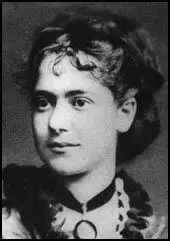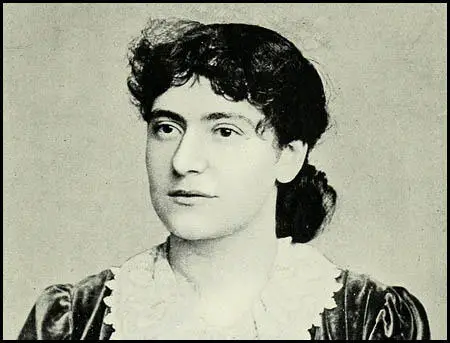Eleanor Marx

Eleanor Marx, the youngest daughter of Karl Marx, was born in London on 16th January 1855. A very intelligent child, she was mainly taught by her father and by the age of three she could recite passages by Shakespeare. Marx, who treated his daughter as a "friend and companion" could converse with her as a child in German and French as well as English. By the time Eleanor was sixteen (1871) she acted as her father's secretary, accompanying him to international conferences on socialism.
When seventeen Eleanor fell in love with a French journalist, Hippolyte Lissagaray. Although Lissagaray and Marx shared the same political views, he disapproved of the relationship because at 34, Lissagaray was twice the age of his daughter.
To emphasize her independence, Eleanor left the family home and found work as a schoolteacher in Brighton. After a year in Brighton she joined up with Hippolyte Lissagaray and helped him write the History of the Commune of 1871. Although Karl Marx liked the book enough to translate it into English, he still refused to give his approval to his daughter's relationship with Lissagaray. In 1876 Eleanor Marx became involved in the campaign for female equality when she helped a female candidate win a seat on a London School Board.
In 1880 Karl Marx now gave Eleanor permission to marry Hippolyte Lissagaray. However, Eleanor was now having doubts about the relationship and in January 1882, Eleanor terminated her long engagement with Lissagaray.
In the early 1880s Eleanor nursed her aging parents. Her mother died in December, 1881, and her father in March, 1883. Before his death, Karl Marx had given Eleanor the task of preparing his unfinished manuscripts for publication. Eleanor also had the task of dealing with the English publication of Das Kapital .
In 1884 Eleanor became involved with Edward Aveling. The two shared the same views on politics and religion and Aveling made his living from giving lectures on these subjects. As Aveling was already married, Eleanor lived with him as his common law wife.
Eleanor Marx and Edward Aveling joined Hyndman's Social Democratic Federation. Eleanor became a close friend of another member of the SDF, Annie Besant. Eleanor Marx, who had a reputation as one of the best orators in England, was elected to the SDF Executive.

Eleanor disagreed with the dictatorial way H. M. Hyndman was running the SDF and in December 1884 joined with William Morris to form the Socialist League. Eleanor now openly advocated "Revolutionary International Socialism" and in 1885 helped organize the International Socialist Congress in Paris. Eleanor also made a successful speaking tour with Aveling of the United States.
In 1886 Eleanor met Clementina Black and began working with her in the Women's Trade Union League. She also helped Annie Besant in her successful Bryant & May match-girl strike. The following year Eleanor helped Will Thorne to organize the National Union of Gas Workers and General Labourers and in 1889 became involved in the Docker's Strike led by her close friend, Ben Tillet.
In 1880s Eleanor took a close interest in the theatre and for a time considered a career in acting. Like Elizabeth Robins, Eleanor was a strong advocate of the plays of Henrik Ibsen. Eleanor believed that the theatre could play an important role in rejecting the traditional views of love and marriage and as a means of propagating socialism.
Eleanor wrote several books and articles including The Factory Hell (1885), The Women Question (1886), The Working Class Movements in America (1888), Shelley's Socialism (1888), and the The Working Class Movement in England (1896). She also contributed many articles for Justice, the political journal edited by H. H. Champion.
In January 1898, Edward Aveling became seriously ill, and Eleanor spent many months nursing him back to health. Soon afterwards she discovered that Aveling had secretly married another woman. Unable to bear the pain of this latest betrayal, Eleanor Marx committed suicide on 31st March, 1898.
Primary Sources
(1) Edward Aveling and Eleanor Marx, The Woman Question (1887)
The truth, not fully recognized even by those anxious to do good to women, is that she, like the labour classes, is in an oppressed condition; that her position, like theirs, is one of merciless degradation. Women are the creatures of an organized tyranny of men, as the workers are the creatures of an organised tyranny of men, as the workers are the creatures of an organized tyranny of idlers.
Both the oppressed classes, women and the immediate producers, must understand that their emancipation will come from themselves. Women will find allies in the better sort of men, as the labourers are finding allies among the philosophers, artists, and poets. But the one has nothing to hope from man as a whole, and the other has nothing to hope from the middle class as a whole.
(2) Ben Tillett, Memories and Reflections (1931)
Another of our helpers at headquarters (during the London Docker's Strike) was Karl Marx's daughter, Eleanor, the tragic wife of Edward Aveling. Brilliant, devoted and beautiful, she was Marx's youngest daughter, and a Londoner by birth. At the time of our strike, she was only thirty years old. She lived with Aveling under very unhappy conditions, which did not break her spirit, or cause her to waver in her devotion to the working-class cause. She was active in support of the efforts we were making to organize unskilled labour in the East End of London. She was destined, poor girl, within a few years to put an end to her unhappiness by taking her own life.
Not many of us knew, at the time, about the wretchedness of her relations with Aveling. He was a man of exceptionally brilliant intellect, a scholar, and a scientist, who taught chemistry, physiology and comparative anatomy at University lecturer. He had an Irishman's charm, but he was wayward, unstable, with darker traits in his character which spelt misery and emotional strain for the woman associated with him.
(3) Olive Schreiner, letter to Havelock Ellis (2nd August, 1884)
I am beginning to have such a horror of Dr. Aveling, other-self. To say I dislike him doesn't express it at all. I have a fear and horror of him when I am near. Every time I see him this shrinking grows stronger... I love her (Eleanor Marx), but he makes me so unhappy. IIe is so selfish but that doesn't account for the feeling of dread. Mrs. Walters has just the same feeling. I had it when I first saw him. I fought it down for Eleanor's sake, but here it is, stronger than ever.
(4) Tom Mann, Memoirs (1923)
One of those who rendered valuable service (during the 1889 Dock Strike) was Eleanor Marx, the daughter of Karl Marx, a most capable woman. Possessing a complete mastery of economics, she was able alike in conversation and on a public platform, to hold her own with the best.
(5) In her diary Beatrice Potter described meeting Eleanor Marx for the first time (24th May, 1883)
Went in the afternoon to British Museum and met Miss Marx in the refreshment rooms. Daughter of Karl Marx, socialist writer and refugee. Gains her livelihood by teaching literature, and writing for socialist newspapers. In person she is comely, dressed in a slovenly picturesque way with curly hair flying about in all directions. Fine eyes full of life and sympathy, otherwise ugly features and expression with complexion showing the signs of an unhealthy excited life, kept up with stimulants and tempered by narcotics. Lives alone, is much connected with Bradlaugh set, evidently peculiar views on love, etc., and I should think has somewhat 'Natural' relations with men! Should fear that the chances were against her remaining long within the pale of "respectable" society.
(6) Henry Snell, Men Movements and Myself (1936)
Eleanor Marx was a woman of heavy build, very dark, widely read and widely travelled, and it was a privilege to talk with her about her distinguished father and his famous friends, Engels, Bebel, and others. Of her husband, Dr. Edward Aveling, little need be said. He was a man of great capacity, a magnificent speaker with a wonderful voice, but his sense of responsibility towards others, or to whatever cause he elected to serve, was quite undeveloped. It was through my acquaintance with Dr. Aveling that I first realised that a fine education and a powerful mind did not of necessity make a fine man.
(7) Eleanor Marx's suicide note to Edward Aveling (31st March, 1898)
My last word to you is the same that I have said during all these long, sad years - love.
(8) Sidney Hook, Out of Step: An Unquiet Life in the 20th Century (1987)
Because of my Guggenheim project, I made several efforts to arrange a meeting with Edouard Bernstein, the famous revisionist of Marx, then living in retirement. His figure and outlook, in the perspective of the fifty years after Marx's death, had grown enormously. I was put off several times, and when I finally met him, I realized why. He was suffering from advanced arteriosclerosis and was attended by a nurse. He seemed at first reluctant to talk about his reminiscences of Marx, but at the outset of our talk, to my chagrin, was eager to describe his first day at school, about which he had very vivid memories. I kept reverting to various episodes of Marx's life and to some of Marx's literary remains, which Engels had entrusted to Bernstein. His manner was benign and friendly. Only twice did he lose his composure and burst out with a stormy lucidity. The first time was when I mentioned Edward Aveling with whom Eleanor Marx, Marx's youngest daughter, had been enamored, and who had been the cause of her suicide. Bernstein rose from his chair with flushed face and agitated tone and voice and denounced him as an "arch scoundrel". I did not, however, get a very coherent account of Aveling's infamy. The second time was when I mentioned in passing that I had been invited to pursue my studies on the period from Hegel to Marx at the Marx-Engels Institute in Moscow by its director, David Ryazanov. When he heard Ryazanov's name, he fumed and charged him with being a liar and a thief, who had stolen materials from the Social Democratic Party archives. Throughout the hour or so when I kept bringing up the name of Lenin in hopes of initiating some discussion of Lenin's Marxism, he made disparaging references to "the Bolsheviks," but my most significant memory of the conversation was his reference to himself, as if he suspected this American pilgrim of an excess of Marxist piety, as a "methodological reactionary." For him socialism was a child of the Enlightenment. "I am still an eighteenth-century rationalist," he said, "and not at all ashamed of it. I believe that in essentials their approach was both valid and fruitful." Was this the method or approach of Marx? I inquired. His answer was not altogether clear, but its drift was that it was a continuation with important historical differences. It was somewhere at this point, as I recall, that he lowered his voice and in a confidential whisper, as if afraid of being overheard, leaned toward me and observed: "The Bolsheviks are not altogether unjustified in claiming Marx as their own. Marx, you know, had a strong Bolshevik streak in him." The nurse who had been silently present all the time signaled me that the interview was over.
Student Activities

